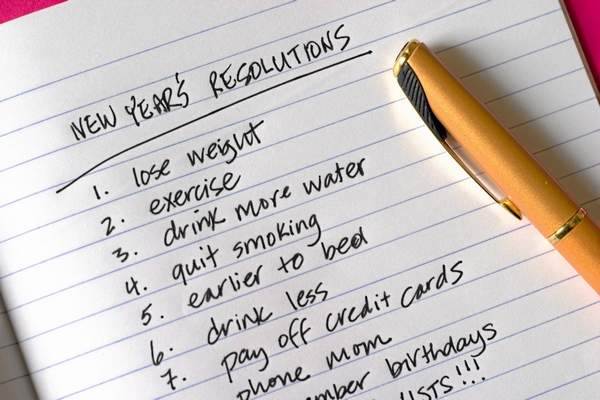Nearly half of us admit to making New Years resolutions! And two thirds of us resolvers vow to change something involving food or exercise! So how many stick to those goals? About 25%!
Why do we have so much trouble keeping New Years’ resolutions? And what can we do to improve our chances of sticking to our intentions? The reasons boil down to this: we set goals that are too vague or ambitious and we fail to consult the Google maps of lifestyle management to figure out the specific roads we need to take to get to our goal or whether those roads even exist!

Let’s take an example. Suppose you resolve to quit eating junk food. You get up on New Year’s Day, and you’re starving, so you go to the kitchen, open the fridge, and…empty! So you head to the pantry and grab the first thing you see: the cookie jar full of mom’s double chocolate chip cookies, the ones you bake every Christmas from her chocolate-stained recipe card and remember her as you eat them and share them with friends and eat more of them…! Resolution blown! In less than 5 minutes into the year!
So, let’s go back to where we started!
Step one is to narrow the focus of your resolution onto something specific: eating only whole, minimally processed foods (like fruits, vegetables, whole grains, meat, fish, and dairy products without sugar added) for at least one meal a day.
Step two is to map out the way and figure out if this is a goal you can get to. What this means is strategizing the day: for starters, if you tend to wake up famished and need to eat before leaving the house and have limited time, then you need to have gone to the supermarket and stocked the fridge and pantry with healthy breakfast choices: plain yogurt, fresh or frozen fruit in single portions, whole wheat bread or English muffins, whole grain high fiber cereal, milk…If you don’t have time to sit down to eat before leaving work, you need to have a few portable breakfast ideas, and a supply of small food storage containers and ziplock bags…Our enthusiasm for making resolutions tends to make us forget about these small but critical details, like when we forget to check the gas gauge as we set off for our Christmas vacation trip…An important part of this step is becoming an environmental analyst and manager. And I don’t mean someone who goes around testing water quality. No, what I mean is figuring out the landmarks and the landmines that help or get in the way of your sticking with your plans and learning to manage or avoid them! At some point, I will write a whole blog about environmental management!
Step three is to establish a system of accountability. Accountability can be one of the biggest challenges in changing behavior because it forces us to honestly appraise how well we are sticking with our plans. The way you stay accountable depends on what you are trying to accomplish: if you are trying to lose weight, you will pretty much need to weigh yourself–or have someone weigh you–at regular intervals. At some point in the near future, I will devote a whole blog to accountability and issues like how often you should weigh yourself. Sometimes, enlisting other people keeps us more accountable than relying on our own willingness to face up to where we are at. For anyone trying to make changes that involve food, I highly recommend keeping food records, because they are data, and data are powerful! With a week’s worth or even a few days worth of food records, you can hazard guesses as to why you did or didn’t lose weight, or why you are bloated and your face looks like a beach-ball, and then test out your theories by changing what you are eating or drinking, writing it all down, and checking the results again a few days later… I am the first to admit I lost and kept off 40 pounds by keeping crude food records in a spiral notebook, long before the days of “Myfitnesspal” with thousands of foods as near as your cell phone! Successful weight losers and other changers of behavior swear by their systems of accountability!
Finally, when it comes to making and sticking to New year’s resolutions or embarking on behavior change, there’s an additional factor we need to consider: habit! Eating habits are often deeply ingrained and the most difficult ones to change are the ones that involve delicious foods like chips and cookies… (be honest: have you ever had to hold yourself back from eating more broccoli?!?). A study released last New Years might shed some real light on why we break our food-related resolutions so easily. The study found that people who resolved to eat more healthfully in the new year would buy healthier foods but they would also continue to buy the cookies, candy, and other special holiday foods they had been buying for the past two months, and having bought them, they would of course have to eat them! So as you embark on the road to better eating, don’t forget to take stock of the eating habits you’ve developed over the past couple of months or the past couple of decades. And figure the work of undoing those habits into the road-map to your goals!
The New York Times likes to feature articles about New Years Resolutions throughout the last week of the year. One of this year’s that I especially like is entitled, “How to Stick to Your New Year’s Resolutions.” Check it out and tell me if it doesn’t resonate with your own experiences!
